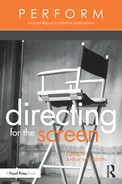CHAPTER 5
STARTING AGAIN
“All of us, every single year, we’re a different person. I don’t think we’re the same person all our lives.”
Steven Spielberg
In our final chapter, we’re tackling the often overwhelming notion of starting again. This can mean starting again after your last film tanked at the box office. Or starting again after your professor said your last cut isn’t working. Or pulling yourself up off the couch after spending hours reading bad reviews. Or figuring out where to go next after financing fell through. Or trying to navigate a business relationship that’s recently gone sour.
Beginning again is an unavoidable part of the cycle of working as a director—or even just aspiring to work as a director. But it’s not always a challenging aspect of the work. Beginning again can also be exciting. It can be storyboarding your next project. Or collaborating with your screenwriter on a rewrite of your next feature. Or flying to Rome to work on a new TV show. Or relocating to Los Angeles. Or meeting with a legendary actor who wants to star in your movie.
It can also mean knowing when it’s time to say goodbye to one leg of your journey and moving on to the next. And rather than mandating that you know where you’re headed, you might just leave open the door for possibility and opportunity.
Remember, too, what Peter Segal said about juggling multiple projects because he never knows which one will pop—and his plans to develop a Holocaust story despite the fact that he’s known for his comedies.
There’s really no telling what this next step might look like. We’ve found ourselves back at the beginning of the cycle, which involves dreaming big. Go ahead and dream it, because where you are at this moment is no indicator of where you’ll be next year. Or twenty years from now.
Who Knew?
Catherine Hardwicke worked as a production designer on twenty films between 1986 and 2002 before directing her first film, Thirteen (2003), which earned Holly Hunter an Oscar nomination. Hardwicke has since directed six features, including Twilight (2008), which earned $400 million at the box office.
Here’s what you’ll read about in this chapter:
•Transmedia storytelling and the future of screen stories and reaching multiple audiences
•Reflections on filmmaking from one of Denmark’s most acclaimed directors
•Reflections on filmmaking from one of Belgium’s most acclaimed directors
•Reflections on filmmaking from one of Spain’s most acclaimed directors
•How to begin again when the box office numbers don’t match the quality of the film
•Strategies for overcoming bad reviews and soured relationships with producers
•Financing your own films as a means of recovery and to take back control
•Lessons from one of the most prolific sitcom directors of the past few decades
•Transitioning from directing theater to directing sitcoms
•Directing for a live audience
•Making your own good fortune
We’ll begin with transmedia storytelling, and we’ll end with making room for good fortune to come your way. With both—and with all of the narrative paths in between—the common theme involves possibility in storytelling. Choosing to look toward a future where there’s any number of new beginnings and limitless possibilities for how the endings might play out.
